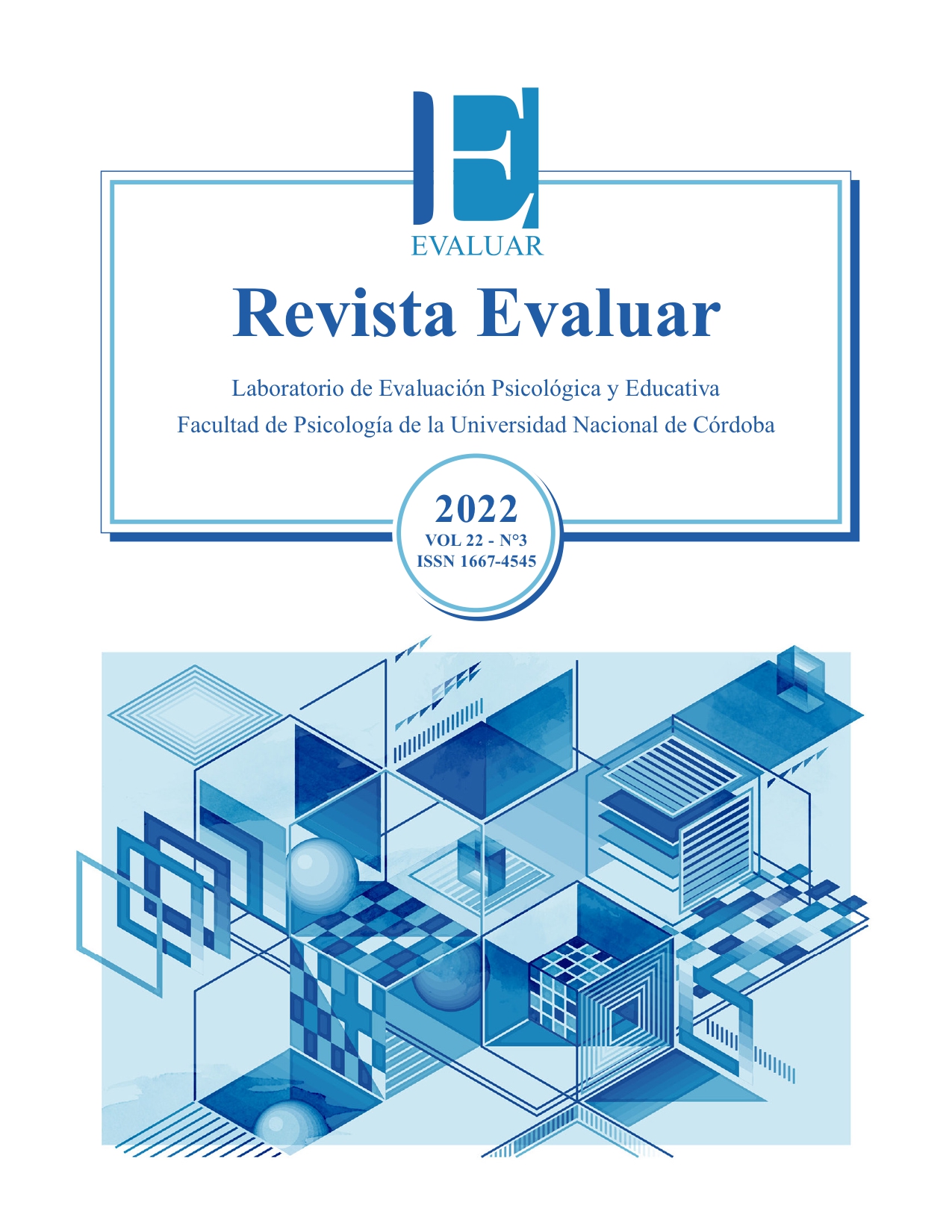Psychometric Properties of the EPOC Adolescent Well-being Scale in Venezuelan Students
DOI:
https://doi.org/10.35670/1667-4545.v22.n3.39986Keywords:
well-being, teenagers, positive psychology, psychometrics, validityAbstract
The aim of this research was to analyze the psychometric properties of the EPOCH Adolescent Well-being Scale in Venezuelan Students. For this purpose, expert judges proceeded to examine the adequacy of the translation of the scale and adjusted five items by means of a reverse translation. Subsequently, the scale was applied to 523 young people between 13 and 18 years of age (M = 15.19; SD = 1.54; 51% males) in order to perform a confirmatory factor analysis that proved a five-dimensional structure (adequate fit indices). However, the factor engagement yielded some low factor loadings (< .5). In addition, an invariance test determined that the measurement model is the same for both sexes. Additionally, the reliability was appropriate for the overall scale and dimensions (α and ω > .7), with the exception of the engagement factor. Consequently, the latter aspect is discussed and suggestions are given regarding future research.
Downloads
References
Acock, A. C. (2012). What to do about missing values. En H. Cooper, P. M. Camic, D. L. Long, A. T. Panter, D. Rindskopf & K. J. Sher (Eds.), APA Handbook of Research Methods in Psychology, Vol. 3. Data Analysis and Research Publication (pp. 27-50). American Psychological Association. doi: 10.1037/13621-002
Aiken, L. R. (1980). Content validity and reliability of single items or questionnaires. Educational and Psychological Measurement, 40(4), 955-959. doi: 10.1177/001316448004000419
Aiken, L. R. (1985). Three coefficients for analyzing the reliability and validity of ratings. Educational and Psychological Measurement, 45(1), 131-142. doi: 10.1177/0013164485451012
Álvarez-Álvarez, E., González-Zepeda, A. P., & Chávez-López, J. K. (2017). Conceptos Iniciales. En F. González-Betanzos, M. del C. Escoto-Ponce de León & J. K. Chávez-López (Eds.). Estadística Aplicada en Psicología y Ciencias de la Salud (pp. 13-35). Ciudad de México: Manual Moderno.
American Psychological Association (2016). Ethical Principles of Psychologists and Code of Conduct. Recuperado de https://www.apa.org
Ato, M., López-García, J. J., & Benavente, A. (2013). Un sistema de clasificación de los diseños de investigación en psicología. Anales de Psicología/Annals of Psychology, 29(3), 1038-1059. doi: 10.6018/analesps.29.3.178511
Bollen, K. A. (1990). A comment on model evaluation and modification. Multivariate Behavioral Research, 25(2), 181-185. doi: 10.1207/s15327906mbr2502_5
Bonett, D. G., & Wright, T. A. (2015). Cronbach’s alpha reliability: Interval estimation, hypothesis testing, and sample size planning. Journal of Organizational Behavior, 36(1), 3-15. doi: 10.1002/job.1960
Brown, T. A. (2015). Confirmatory Factor Analysis for Applied Research. New York, NY: Guilford Press.
Brown, T. A., & Moore, M. T. (2014). Confirmatory factor analysis. En R. H. Hoyle (Ed.). Handbook of Structural Equation Modeling (pp. 361-379). New York, NY: Guilford Press.
Chahín-Pinzón, N. (2014). Aspectos a tener en cuenta cuando se realiza una adaptación de test entre diferentes culturas. Psychologia. Avances de la Disciplina, 8(2), 109-112. doi: 10.21500/19002386.1225
Cheung, G. W., & Rensvold, R. B. (2002). Evaluating goodness-of-fit indexes for testing measurement invariance. Structural Equation Modeling, 9(2), 233-255. doi: 10.1207/S15328007SEM0902_5
Chui, W. H., & Wong, M. Y. H. (2016). Gender differences in happiness and life satisfaction among adolescents in Hong Kong: Relationships and self-concept. Social Indicators Research, 125(3), 1035-1051. doi: 10.1007/s11205-015-0867-z
Demirci, İ., & Ekşi, F. (2015). Ergenler için beş boyutlu iyi oluş modeli: EPOCH ölçeği’nin Türkçe formunun geçerliği ve güvenirliği. Gençlik Araştırmaları Dergisi, 3(3), 9-30. Recuperado de https://toad.halileksi.net/wp-content/uploads/2022/07/epoch-olcegi-toad.pdf
Diener, E., Lucas, R. E., & Oishi, S. (2018). Advances and open questions in the science of subjective well-being. Collabra: Psychology, 4(1), 15. doi: 10.1525/collabra.115
Diener, E., Oishi, S., & Tay, L. (2018). Advances in subjective well-being research. Nature Human Behaviour, 2(4), 253-260. doi: 10.1038/s41562-018-0307-6
Fernández, A., Pérez, E., Alderete, A. M., Richaud, M. C., & Fernández-Liporace, M. (2010). ¿Construir o adaptar tests psicológicos? Diferentes respuestas a una cuestión controvertida. Revista Evaluar, 10(1), 60-74. doi: 10.35670/1667-4545.v10.n1.459
Ferrando, P. J., & Lorenzo-Seva, U. (2017). Program FACTOR at 10: Origins, development and future directions. Psicothema, 29(2), 236-240. Recuperado de https://www.psicothema.com
Ferrando, P. J., Lorenzo-Seva, U., Hernández-Dorado, A., & Muñiz, J. (2022). Decálogo para el análisis factorial de los ítems de un test. Psicothema, 34(1), 7-17. Recuperado de http://www.psicothema.com
Hair, J. F., Black, W. C., Babin, B. J., & Anderson, R. E. (2018). Multivariate Data Analysis. Boston, MA: Cengage.
Hernández, A., Hidalgo, M. D., Hambleton, R. K., & Gómez-Benito, J. (2020). International Test Commission guidelines for test adaptation: A criterion checklist. Psicothema, 32(3), 390-398. Recuperado de http://www.psicothema.com
Kaplan, D. (1989). Model modification in covariance structure analysis: Application of the expected parameter change statistic. Multivariate Behavioral Research, 24(3), 285-305. doi: 10.1207/s15327906mbr2403_2
Kern, M. L., Benson, L., Steinberg, E. A., & Steinberg, L. (2016). The EPOCH measure of adolescent well-being. Psychological Assessment, 28(5), 586-597. doi: 10.1037/pas0000201
Kern, M. L., Zeng, G., Hou, H., & Peng, K. (2019). The Chinese version of the EPOCH measure of adolescent well-being: Testing cross-cultural measurement invariance. Journal of Psychoeducational Assessment, 37(6), 757-769. doi: 10.1177/0734282918789561
Londoño-Pérez, C., Velasco-Salamanca, M., Alejo-Castañeda, I., Botero-Soto, P., & Joliet-Vanegas, I. (2014). What makes us optimistic?: Psychosocial factors as predictors of dispositional optimism in young people. Terapia Psicológica, 32(2), 153-164. doi: 10.4067/S0718-48082014000200008
Love, J., Selker, R., Marsman, M., Jamil, T., Dropmann, D., Verhagen, J., ... Wagenmakers, E.-J. (2019). JASP: Graphical Statistical Software for Common Statistical Designs. Journal of Statistical Software, 88(2), 1-17. doi: 10.18637/jss.v088.i02
Maddux, J. E. (2017). Subjective well-being and life satisfaction. An introduction to conceptions, theories, and measures. En J. E. Maddux (Ed.). Subjective Well-Being and Life Satisfaction (pp. 3-32). doi: 10.4324/9781351231879
Mardia, K. V. (1970). Measures of multivariate skewness and kurtosis with applications. Biometrika, 57(3), 519-530. doi: 10.1093/biomet/57.3.519
Maurer, M. M., Daukantaitė, D., & Hoff, E. (2021). Testing the psychometric properties of the Swedish version of the EPOCH measure of adolescent well-being. PloS One, 16(10), e0259191. doi: 10.1371/journal.pone.0259191
Muñiz, J. (2018). Introducción a la Psicometría. Teoría Clásica y TRI. Madrid: Ediciones Pirámide.
Muñiz, J., Elosua, P., & Hambleton, R. K. (2013). Directrices para la traducción y adaptación de los tests: Segunda edición. Psicothema, 25(2), 151-157. Recuperado de https://www.psicothema.com
Ortiz-Correa, P., Proestakis-Maturana, A., & Leiva-Gutiérrez, J. (2020). Adaptación chilena de la Escala de Bienestar Adolescente EPOCH. Revista Electrónica en Educación y Pedagogía, 4(7), 54-66. doi: 10.15658/rev.electron.educ.pedagog20.11040705
Peña, G. (2017). Estadística Inferencial: Una Introducción para las Ciencias del Comportamiento (2da ed.). Caracas, Venezuela: ABediciones.
Putnick, D. L., & Bornstein, M. H. (2016). Measurement invariance conventions and reporting: The state of the art and future directions for psychological research. Developmental Review, 41, 71-90. doi: 10.1016/j.dr.2016.06.004
Ramada-Rodilla, J. M., Serra-Pujadas, C., & Delclós-Clanchet, G. L. (2013). Adaptación cultural y validación de cuestionarios de salud: Revisión y recomendaciones metodológicas. Salud Pública de México, 55(1), 57-66. Recuperado de https://saludpublica.mx
Richaud de Minzi, M. C. (2008). Nuevas tendencias en psicometría. Revista Evaluar, 8(1), 1-19. doi: 10.35670/1667-4545.v8.n1.501
Rose, T., Joe, S., Williams, A., Harris, R., Betz, G., & Stewart-Brown, S. (2017). Measuring mental wellbeing among adolescents: A systematic review of instruments. Journal of Child and Family Studies, 26(9), 2349-2362. doi: 10.1007/s10826-017-0754-0
Seligman, M. E. P. (2016). Florecer: La Nueva Psicología Positiva y la Búsqueda del Bienestar. Ciudad de México: Océano.
Seligman, M. E. P. (2019). Positive psychology: A personal history. Annual Review of Clinical Psychology, 15(1), 1-23. doi: 10.1146/annurev-clinpsy-050718-095653
Seligman, M. E. P., & Csikszentmihalyi, M. (2000). Positive psychology: An introduction. American Psychologist, 55(1), 5-14. doi: 10.1037/0003-066X.55.1.5
Taheri, A., Pourshahriari, M., Abdollahi, A., & Hosseinian, S. (2022). Psychometric assessment of the Persian translation of the EPOCH measure among adolescent girls. Current Psychology 41, 4961-4970. doi: 10.1007/s12144-020-01013-7
Universidad Católica Andrés Bello (2002). Contribuciones a la Deontología de la Investigación en Psicología. Caracas, Venezuela: Escuela de Psicología UCAB.
VandenBos, G. R. (2015). APA Dictionary of Psychology (2da ed.). EE. UU.: American Psychological Association. doi: 10.1037/14646-000
Zelenski, J. M. (2019). Positive Psychology: The Science of Well-being. Londres, Reino Unido: Sage.
Zeng, G., & Kern, M. L. (2019). The Chinese EPOCH measure of adolescent wellbeing: Further testing of the psychometrics of the measure. Frontiers in Psychology, 10, 1457. doi: 10.3389/fpsyg.2019.01457
Zhang, K., Wu, S., Xu, Y., Cao, W., Goetz, T., & Parks-Stamm, E. J. (2021). Adaptability promotes student engagement under COVID-19: The multiple mediating effects of academic emotion. Frontiers in Psychology, 11. doi: 10.3389/fpsyg.2020.633265
Downloads
Published
How to Cite
Issue
Section
License
Copyright (c) 2022 Luis Rodríguez Chávez, María Graciela Fernández-Siliano

This work is licensed under a Creative Commons Attribution 4.0 International License.
Revista Evaluar aplica la Licencia Internacional de Atribuciones Comunes Creativas (Creative Commons Attribution License, CCAL). Bajo esta licencia, los autores retienen la propiedad de copyright de los artículos pero permiten que, sin que medie permiso de autor o editor, cualquier persona descargue y distribuya los artículos publicados en Evaluar. La única condición es que siempre y en todos los casos se cite a los autores y a la fuente original de publicación (i.e. Evaluar). El envío de artículos a Evaluar y la lectura de los mismos es totalmente gratuito.




_(3).jpg)



.jpg)



